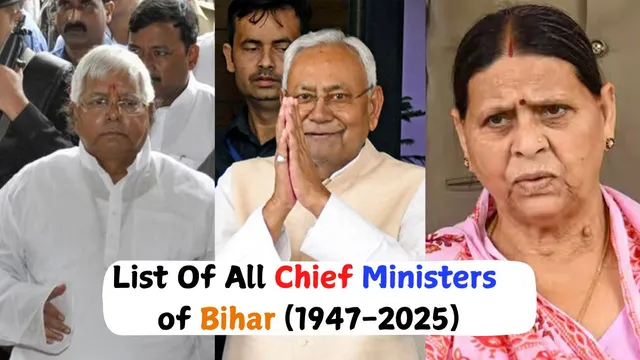- By Aditi Priya Singh
- Wed, 05 Nov 2025 05:05 PM (IST)
- Source:JND
Full List Of Chief Ministers of Bihar: Since India's independence, Bihar's political landscape has seen several prominent leaders, each of whom has had a unique effect on the development and governance of the state. Bihar's rich political history and the leaders who shaped it are once again in the spotlight as the state prepares for the 2025 Assembly Elections, which are set for November 6 and 11. The state has experienced dynamic shifts in leadership, ideology, and governance style, from Nitish Kumar, who remains a key figure in the development of modern Bihar, to Shri Krishna Sinha, the state's first chief minister and a close associate of Mahatma Gandhi.
The Chief Ministers of Bihar have addressed a lot of topics over the years, including social justice, infrastructure, law and order, poverty, and education. While Nitish Kumar placed a strong emphasis on development and good governance, leaders like Lalu Prasad Yadav and Rabri Devi promoted social equality. To better understand how Bihar changed over the years, from its post-independence struggles to its current aspirations for stability and progress, voters should study this political journey as they get ready for the 2025 elections.
Complete List Of All Chief Ministers From 1947 to 2025
| Name | Tenure | Key Achievements / Highlights | |
|---|---|---|---|
| Shri Krishna Sinha | 1947– 1961 | First CM of Bihar; led post-independence reforms; promoted education and industrial development. | |
| Deep Narayan Singh | Feb 1961 – Oct 1961 | Short tenure; focused on administrative stability after Shri Krishna Sinha’s death. | |
| Binodanand Jha | 1961 – 1963 | Worked on rural development and infrastructure; promoted cooperative movements. | |
| K. B. Sahay | 1963 – 1967 | Implemented land reforms; emphasised modernisation of agriculture. | |
| Mahamaya Prasad Sinha | 1967 – 1968 | First non-Congress CM; worked on coalition governance and political reforms. | |
| Satish Prasad Singh | Jan 1968 – Feb 1968 | Shortest tenure (just 5 days); represented social justice politics. | |
| Bindeshwari Prasad Mandal | Feb 1968 – Mar 1968 | Focused on backward class upliftment and social equality. | |
| Bhola Paswan Shastri | 1968 – 1969, 1971–1972, 1977–1978 | Served three times; promoted education and administrative reforms. | |
| Daroga Prasad Rai | Feb 1970 – Dec 1970 | Improved law and order; promoted industrial development. | |
| Karpoori Thakur | 1970 – 1971, 1977 – 1979 | Introduced reservation for backward classes; known as “Jan Nayak.” | |
| Jagannath Mishra | 1975 – 1977, 1980 – 1983, 1989 – 1990 | Reforms in education, implemented the “Bihar Press Bill”, and strengthened rural infrastructure. | |
| Chandrashekhar Singh | 1983 – 1985 | Focused on administrative modernisation and economic policies. | |
| Bindeshwari Dubey | 1985 – 1988 | Emphasised labour rights and rural electrification. | |
| Bhagwat Jha Azad | 1988 – 1989 | Improved law and order; promoted tourism in Bihar. | |
| Satyendra Narayan Sinha | 1989 – 1990 | Worked on flood control and educational improvements. | |
| Lalu Prasad Yadav | 1990 – 1997 | Introduced social justice reforms; empowered and marginalised communities. | |
| Rabri Devi | 1997 – 2005 | First woman CM of Bihar; focused on women's empowerment and rural schemes. | |
| Nitish Kumar | 2005 – 2014 | Transformed Bihar’s infrastructure, education, and law and order | |
| Jitan Ram Manjhi | 2014 – 2015 |
| |
| Nitish Kumar | 2015 – Present (2025) | Changed party alliance multiple times, but still known as “Sushasan Babu.” |
Bihar’s political journey has been shaped by several influential Chief Ministers whose leadership left a lasting mark on the state’s socio-political fabric.
Modern Bihar was founded by Shri Krishna Sinha, who spearheaded industrial and educational reforms in the years following independence.
Recommended For You
Known as Jan Nayak, Karpoori Thakur instituted reservations for the underprivileged, but his policies caused controversy among the upper castes.
Jagannath Mishra started the Bihar Press Bill and education reforms, the latter of which sparked debate over media freedom.
Lalu Prasad Yadav transformed Bihar’s politics through social justice movements and the empowerment of marginalised communities, but his tenure was overshadowed by the Fodder Scam.
Although she carried on her husband's political legacy as the state's first female chief minister, Rabri Devi was frequently criticised for her ineffective administration.
Nitish Kumar, also known as Sushasan Babu, is credited with reestablishing law and order, building infrastructure, and enhancing education; however, his frequent changes in coalition partners and political affiliations have come under fire.
Together, these leaders reflect Bihar’s evolution from post-colonial reconstruction to modern governance, embodying both progress and political turbulence.





